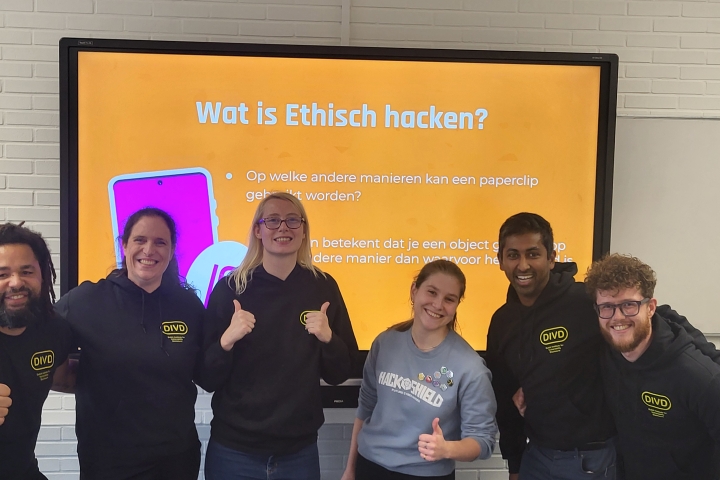How to Start your Career in Cybersecurity?
The Netherlands is highly digitized and thus susceptible to cyber-attacks, from hospitals to banks. In the event of a successful cyber-attack, the impact can be enormous. It is important to safeguard data, keep services running and prevent data breaches. This requires sufficient cybersecurity specialists, but there are none. With the many training options available, it can be difficult to choose and join the cybersecurity field. We'd love to help you get started on your cybersecurity career!
There are several paths that lead to Rome. With this article we provide some tools, such as info about the job market, tips for getting started, reference to online orientation opportunities, entry points for training and education and of course jobs in this field.
Discover and orient
Because cyber security is becoming more and more essential in our society, there are many job opportunities, development possibilities and growth perspectives in this field of work. Through a test on cybersecuritywerkt.nl you can see which part of cybersecurity could be interesting for you. It does not matter whether you come from the ICT corner (technology), have affinity with policy, management, processes and coordination (organization) or have an HRM or behavioural science background (people). There is room for lateral entrants from different backgrounds and sectors.
Because the field is young and positions are not yet set in stone, you can build a great career and often shape it yourself. From an entry-level position in cybersecurity, you can use courses, bootcamps and small-scale projects to develop further into a senior, specialist or leadership role. Before you start all kinds of courses, it is useful to choose a field of work within cybersecurity. That way you can focus on it and find matching courses, bootcamps and training.
Choose an entry-level direction in the cybersecurity field
Are you considering a development or transfer? There are plenty of full-time and part-time jobs now and in the future with full focus on the cyber domain. There are several directions you can choose. For example, if you go for a retraining towards the technical side of cyber security, you can choose red teaming or blue teaming. Red teaming involves ethical hacking, where systems are tested for weaknesses. Vulnerabilities are discovered and reported by breaking into websites, applications and systems with the consent of the employer(s). In blue teaming, as a specialist, you try to prevent and repel attacks. Thus, the responsibility for website, application, and system security rests with the blue team. Think of working with a team of system and network specialists or software developers.

Next to the technical side is the organizational side of cyber security. If you choose to retrain to the organizational side, you will be dealing mainly with information security policies and privacy protection. At the head of information security is a Chief Information Security Officer (CISO), as a CISO you do not have to be a technical specialist. However, you do have to deal with various technical topics such as artificial intelligence and Internet of Things. You will also deal with organizational topics such as resilience (resilience of the organization) and risk management (which ones are there and what do you do about them). The privacy side deals with the privacy law and how it is implemented and monitored within an organization. The human side deals with employee behaviour, the security culture and support for protective measures. Job profiles often contain a mix of technology, organization and people.
Another aspect is the application domain and its specific requirements. You can go and work for an employer whose specialty is cybersecurity and take care of that for different application and domains, but if, for example, you have great affinity with healthcare, education, logistics, finance, manufacturing or another application domain then it is good to know what is considered important when it comes to cybersecurity. If you are going to work on the cybersecurity of medical equipment or picking machines in greenhouses then knowledge of OT security will come in handy, if you want to work for the information provision of municipalities or at a bank then knowledge of laws and regulations (compliance) will be more important.
Retraining for the cybersecurity field
There are many opportunities to broaden your cyber security knowledge through activities and training. If you already know what direction you want to go in, that will help with selection. There is an impressive list of certificates that you can obtain and there are several online tips on which ones to obtain. But start at the beginning: with a broader introduction to the subject and some basic technical knowledge. Several of HSD's partners also offer training, some introductory courses can be found at cybersecuritywerkt.nl (in Dutch) and more advanced ones can be found at securitytalent.nl/education. The partners are often very willing to also advise you personally on what suits you and your career.
Want to stay up to date with the latest jobs, internships, training, and courses? Take a look at cybersecuritywerkt.nl for retraining and starter jobs in cybersecurity and for a broader and more advanced offer with also labour market information on securitytalent.nl.
This article has been written by Amanda de Miranda and Mark Ruijsendaal with funding from the ‘Kansen voor West' programme, which aims to give the economy in the 'Randstad' an innovative boost. Kansen voor West is funded by the European Regional Development Fund (ERDF) / REACT EU.
---------------------
Nederland is sterk gedigitaliseerd en daarmee vatbaar voor cyberaanvallen, van ziekenhuizen tot banken. Bij een succesvolle cyberaanval kan de impact enorm zijn. Het is belangrijk om data te waarborgen, diensten in bedrijf te houden en datalekken te voorkomen. Dit vraagt om voldoende cybersecurityspecialisten, maar die zijn er niet. Met de vele beschikbare scholingsmogelijkheden kan het lastig zijn om een keuze te maken en toe te treden tot het cybersecuritywerkveld. We helpen je graag op weg met jouw cybersecuritycarrière!
Er zijn meerdere wegen die naar Rome leiden. Met dit artikel geven we een aantal handvatten, zoals info over de arbeidsmarkt, tips om te starten, verwijzing naar online oriëntatiemogelijkheden, ingangen voor trainingen en opleidingen en natuurlijk banen in dit veld.
Ontdek en oriënteer
Doordat cybersecurity steeds essentiëler wordt in onze maatschappij, zijn er veel baankansen, ontwikkelmogelijkheden en groeiperspectieven in dit werkgebied. Via een keuzetest op cybersecuritywerkt.nl kan je zien welk deelgebied van cybersecurity interessant voor je kan zijn. Het maakt niet uit of je uit de ICT-hoek komt (techniek), affiniteit hebt met beleid, management, processen en coördinatie (organisatie) of een HRM of gedragswetenschappelijke achtergrond hebt (mensen). Er is plaats voor zij-instromers vanuit verschillende achtergronden en sectoren.
Omdat het werkveld jong is en functies nog niet in beton gegoten zijn, kun je een mooie loopbaan opbouwen en vaak zelf ook vormgeven. Vanuit een startersfunctie in cybersecurity kan je aan de hand van cursussen, bootcamps en kleinschalige projecten je verder ontwikkelen naar een senior, specialistische- of leiderschapsrol. Voordat je aan allerlei cursussen begint, is het handig om een werkveld binnen cybersecurity te kiezen. Zo kan je je daarop focussen en bijpassende cursussen, bootcamps en trainingen vinden.
Kies een startrichting in het cybersecurity werkveld
Overweeg je een ontwikkeling of overstap? Er zijn voldoende fulltime en parttimebanen nu en in de toekomst met volledige focus op het cyberdomein. Er zijn diverse richtingen die je kunt kiezen. Ga je bijvoorbeeld voor een omscholing naar de technische kant van cybersecurity, dan kan je kiezen voor red teaming of blue teaming. Bij red teaming houd je je bezig met ethisch hacken, systemen worden op deze manier getest op zwakheden. Kwetsbaarheden worden ontdekt en gerapporteerd door met toestemming van de werkgever(s) in te breken in websites, applicaties en systemen. Bij blue teaming probeer je als specialist aanvallen juist te voorkomen en af te weren. De verantwoordelijkheid voor de beveiliging van websites, applicaties en het systeem ligt dus bij het blauwe team. Denk aan samenwerken met een team van systeem- en netwerkspecialisten of softwareontwikkelaars.
Naast de technische kant staat de organisatorische kant van cybersecurity. Als je ervoor kiest om je om te scholen naar de organisatorische kant dan heb je vooral te maken met informatiebeveiligingsbeleid en privacybescherming. Aan het hoofd van de informatiebeveiliging staat een Chief Information Security Officer (CISO), als CISO hoef je niet een technisch specialist te zijn. Wel heb je te maken met verschillende technische onderwerpen zoals artificial intelligence en Internet of Things. Ook zal je je bezighouden met organisatorische onderwerpen zoals resilience (weerbaarheid van de organisatie) en risicomanagement (welke zijn er en wat doe je eraan). De privacy kant houdt zich bezig met de privacy wet en hoe deze binnen een organisatie geïmplementeerd en bewaakt wordt. De menselijke kant gaat over gedrag van medewerkers, de veiligheidscultuur en het draagvlak voor beschermingsmaatregelen. In functieprofielen zit vaak een mix van techniek, organisatie en mens.
Een ander aspect is het toepassingsdomein en de specifieke vereisten die dat stelt. Je kunt gaan werken voor een werkgever wiens specialisme cybersecurity is en dat verzorgd voor verschillende toepassing en domeinen, maar als je bijvoorbeeld grote affiniteit hebt met zorg, onderwijs, logistiek, financiën, maakindustrie of een ander toepassingsdomein dan is het goed te weten wat daar belangrijk wordt gevonden als het gaat om cybersecurity. Ga je werken aan de cybersecurity van medische apparatuur of plukmachines in kassen dan zal kennis van OT-security van pas komen, wil je werken voor de informatievoorziening van gemeenten of bij een bank dan zal wet- en regelgevingskennis (compliance) belangrijker zijn.
Omscholen naar het cybersecurity werkveld
Er zijn veel mogelijkheden om je cybersecurity kennis te verbreden aan de hand van activiteiten en trainingen. Als je al weet welke richting je op wilt dan helpt dat met selecteren. Er wordt een indrukwekkend overzicht bijgehouden van certificaten die je kunt behalen en er zijn verschillende online tips te vinden over welke te behalen. Maar begin bij het begin: met een bredere introductie in het onderwerp en wat basale technische kennis. Verschillende partners van HSD bieden ook trainingen aan, enkele introductietrainingen staan op Cyber Security Werkt en meer geavanceerde zijn te vinden op https://securitytalent.nl/education. De partners zijn vaak zeer bereid je ook persoonlijk te adviseren wat bij jouw en je carrièrewensen past.
Op de hoogte blijven van de meest recente banen, stages, trainingen en cursussen? Neem een kijkje op cybersecuritywerkt.nl voor omscholing en startersbanen in cybersecurity en voor een breder en geavanceerder aanbod met ook arbeidsmarktinformatie op securitytalent.nl.
This article has been written by Amanda de Miranda and Mark Ruijsendaal with funding from the 'Kansen voor West' programme, which aims to give the economy in the 'Randstad' an innovative boost. 'Kansen voor West' is funded by the European Regional Development Fund (ERDF) / REACT EU.




















